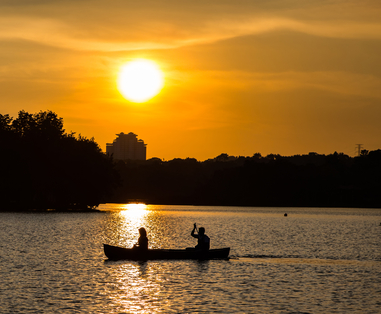 In October, my husband and I took our 25th annual fall camping trip to upstate New York. In the past few years, circumstances were such that we couldn’t take our usual full week from weekend to weekend and only managed to squeak out about 5 days. Heavenly though they were, it was not the same as taking an entire week off.
In October, my husband and I took our 25th annual fall camping trip to upstate New York. In the past few years, circumstances were such that we couldn’t take our usual full week from weekend to weekend and only managed to squeak out about 5 days. Heavenly though they were, it was not the same as taking an entire week off.
This trip is always a time for me to renew, restore, relax, re-trench. There is nothing to do, no agenda to pursue, no clock to watch, no place to be other than where I am. This year, I experimented with being fully unplugged. Deep into the woods, with no cell nor internet service.
We have a little pop up camper to keep us off the ground and out of the potential inclement weather at night, but we mostly spend our days outdoors – hiking, biking, canoeing, eating, reading, sleeping, sitting in front of the campfire watching the squadrons of ducks and geese take off and land in the lake right beside our little patch of heaven.
We usually start the day with a strong cup of coffee and then ready the canoe to launch into the water with our second cup. One cool early morning, as we paddled around the crystal clear, calm and mirror-like lake, the only sound we could hear was the rustling of the wind through the brilliant autumn leaves.
As we glided over the water, we picked up our paddles so not even the soft tinkle of the water glancing off the blades disturbed the sounds of nature. Imagine – not a whirr of an engine, the hum of a motor, nor a human cough – nary a single man-made sound could be heard. The strength of the silence was almost palpable. And it was pure; it was deep; it was so intense that I almost felt myself melt into oblivion.
I have been thinking a lot about this experience since I’ve come back to “civilization.” We live in such a fast-paced and noisy world these days. So much is demanded of us that it’s hard to set those boundaries, hold the line, stave off the onslaught and find those silent places where we can remember who we are and just “be.”
I’m reminded of this so often in my mediation sessions. My heart goes out to my clients, whose lives are lived trying to balance the hectic pace of work, family, home owning responsibilities and the like. And now they find themselves with yet another huge and daunting task before them – the emotional and financial business of separating. It’s hard to find a quiet place to “be” with this.
But sometimes, it’s important to make time to lift those oars up and stop paddling for a while.
Social Media Comments
Hi Ada. I am a new family mediator and your blog inspires me. I absolutely agree that we must stop paddling and take a time out in this fast paced world to keep balanced and to stay grounded. Thanks for your wisdom…carpe diem.
Evelyne Benitah
____________________________________________________________
Ada – What a timely reminder of the importance of stopping for a moment and how that can bring peace. I enjoyed your blog. Thank you.
Deborah Wayne
____________________________________________________________
In your accustomed way, you have taken an observation during a simple slice of life and made it an insightful Observation about Life. May I offer another thought about silence? I think it’s related. Silence opens things not just for people who are getting away from the quotidien and their everyday settings. It is also important when people are most focused on their problems, … and their conflicts. As in many conversations, there’s sometimes a lull when no one is speaking in a mediation session. Those silences can often be the strongest carriers of content and meaning. How long everyone chooses to let the silence last, who speaks first and next, what they say and for how long they speak, can all convey a tremendous amount of information. When the mediator allows the silence to go on — curbing the instinct to keep the words moving — she or he opens the space for the parties to quietly think and reflect. Very often, the next thing after a silence is very profound or productive or both. Musicians sometimes say that the rests are as important as the notes. In the previous paragraph, I almost wrote “… keep the conversation moving.” Maybe that’s the difference. In mediation, as so many other contexts, the “conversation” is the whole interaction (words, expressions, looks, smiles, frowns, body language, silences …), and the words are but words.
Charles Newman
__________________________________________________________
Silence and personal regrouping and focus is clearly crucial but one should not forget the power of silence within the mediation process itself. Having worked with people involved in tele-sales silence can e a powerful tool in getting movement from a voice at the end of a phone. It can be used a s part of negotiation and can give significant clues as to the importance and or/relevance of topics being discussed. Pregnant pauses often provide more clues than answers that ultimately follow giving a mediator more to work with.
Simon S Aronsohn
__________________________________________________________
Hi Ada, in our training of mediators we have what we call ‘clearing’ at the start of each day where each person is given space to say anything that is on their mind that they want to ‘clear’ before continuing with the rest of the day. The point is not to start a discussion but for the rest to just ‘witness’ what the person says without feeling they have to ‘respond’ / sympathise/fix it etc. As a result there can sometimes be periods of silence where everyone has a chance to just stop and reflect rather than feel the need to ‘fill the space’, as if there is an addiction to having to do so. This can be a very useful experience for taking into mediation practice as the mediator doesn’t feel they have to keep the discussion going at all costs but can allow, and be comfortable themselves with, the space for people to just stop and breathe and reflect on what has been said/what they are thinking/ what they are there for. So for us there is a strong connection between silence and mediation.
Alan Sharland
__________________________________________________________
Our fast-paced lives keep us all dangling on the verge of burn-out – a pleasant reminder of the need for periodic breaks to places of solitude
Tracey-Leigh Wessels
__________________________________________________________
What a lovely and idyllic picture of peace and quiet! I love silence and believe it can be a very important indicator and possibly even a tool. I have long believed that one of the true marks of friendship is being able to sit in silence with someone and neither party feels uncomfortable. I sometimes like to use silence in a very positive way in the course of mediation. It can be very tempting to fill periods of silence when a mediation meeting falls silent. However, it can also be very revealing just to sit and listen to the silence and wait to see who breaks it and how/why they choose to do so. Very few people are comfortable with silence in such circumstances and their ways of breaking it can be very informative. I especially like to use it if a mediation meeting gets a bit heated and perhaps people are venting very enthusiastically. The silence that can reign afterwards can often symbolise a time for recognition that shouting at each other is probably not going to resolve the issues between the parties and that they need to find a more constructive and cooperative/collaborative way forward. I often recount the anecdote of a mediation in which I found myself surrounded by 5 women all from the same African tribal background. I was the only one left sitting down as their shouting/venting reached a crescendo. I chose to remain silent and not to intervene as I perceived that although they were all very animated, they were all comfortable and no one was showing any signs of being bothered or intimidated by the conduct of any of the others. After a few minutes, they all noticed that I was sitting silently observing and their shouting subsided and they all fell silent. I let the silence hang in the air for what seemed like a really uncomfortably long period before addressing how they all felt about what had just happened and what (if anything) it showed about how they might resolve their differences. The impact was incredible and within about 40 minutes we moved from mayhem to a well-considered agreement that completely resolved their issues. Ever since, I have become a great advocate of shutting up. It takes great courage and resolve sometimes, but it really can be worth it.
Antony Sendall
__________________________________________________________
Having been to a Vipassana meditation of nine days of silence with no communication; no eye contact; no reading material; nothing, I realized that I, for I can only speak for myself; say too much and much of what I say is not worth saying. Listening with ones whole being and watching mindfully are so powerful.
Paul Henry
__________________________________________________________
Thanks, nice article. Sometimes even mediation can assume a fairly fast, “gotta work it out” pace. I’ve found that silence (from the mediator) can sometimes help slow things down and help the parties drop more deeply into what matters.
John Morrison
__________________________________________________________
YES! I love this! I love being in nature and those aha moments of pure natural silent bliss! It is important to be able to replicate a similar feeling amongst the everyday… even if it is just a moment of deep breathing and meditation…. thank you for this Ada:) A perfect story to kick off the weekend:) Cheers!
Anne Hastry Sleeman
__________________________________________________________
I am reminded of my early days of practice in mediation in the 1990’s. I often had to be very careful in discussions about mediation with the “uninitiated.” All too often they would ask what all of this had to do with “meditation.” Similarly (but well off the tenor of this current discussion here), were those who HEARD “inner space” mediation, when I was trying to EXPLAIN “interest-based” mediation. Sometimes it is hard to be the one riding ahead of the herd. Every now and again, you must look back to see if they are still following you.
James E. “Jim” Gordon
__________________________________________________________
Given that mediation involves lots of intricate personal family details for me, stopping paddling and being ‘still’ generally only happens when the hustle bustle of the city is somewhere else! Thanks Ada, love it.
Kat Steeneken
- Is the Child Support Statute in New York State Still Relevant Today? (video) - April 2, 2024
- Managing Expectations Post-Separation or Divorce (video) - March 6, 2024
- Maintenance and Child Support Re-Visited (video) - February 21, 2024


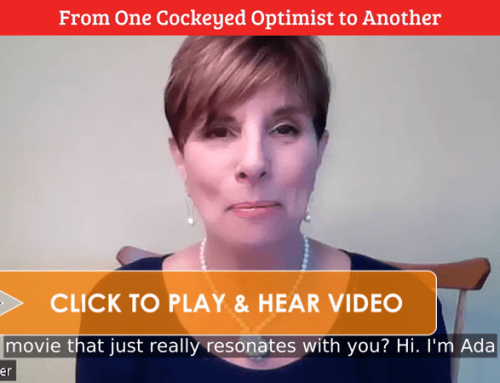
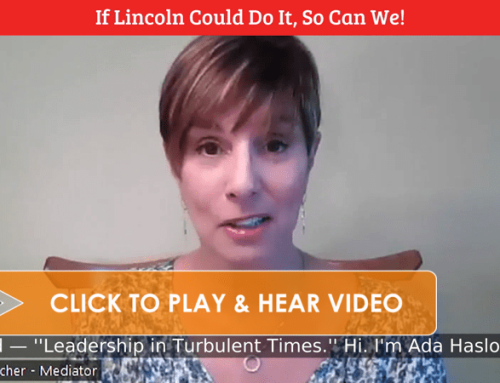
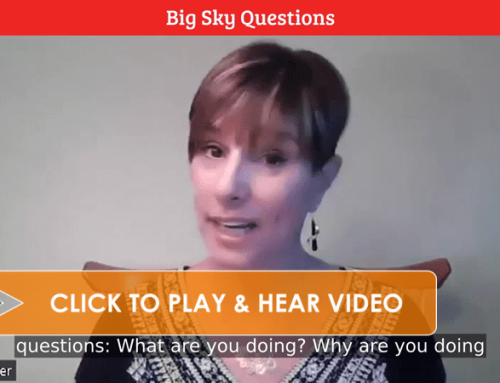
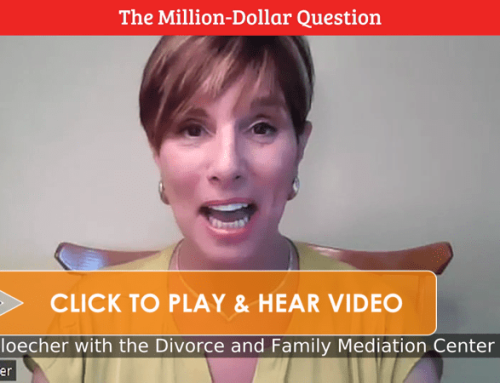
Lovely post, Ada. Wouldn’t it be soothing to sit quietly for 5 minutes before our Thanksgiving meal gatherings and just BE in gratitude? I think I’ll try it!
Ada,
I enjoyed your blog. Unplugging and taking time can be both grounding and inspiring. It’s a powerful way to care for the self.
Wishing you a happy, peaceful and balanced 2015!
Rachel Alexander